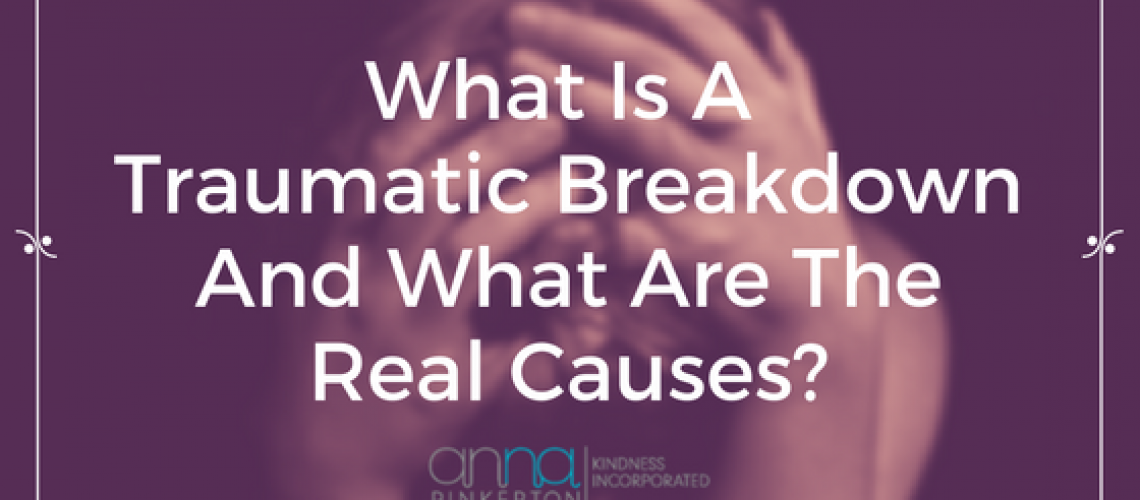Trauma is when you have a single event that’s so incredibly shocking to all senses, it’s completely and utterly overwhelming, and if something’s happened in your life that isn’t overwhelming it isn’t trauma.
It’s really helpful to people who are traumatized to know that that’s the very nature of it: it is overwhelming to all senses, in all areas of prior gained resources and resiliencies.
Trauma can also be chronic, i.e. it can be a slow build up of stresses where the body and mind cope with each stress one at a time. Each experience leaves a residual effect. As more and more stresses build the person is incrementally weakened.
This finally can culminate into a traumatic breakdown. So, it’s not a one off overwhelming event, it’s a build up of events and experiences that can finally overwhelm all prior gained resources and resilience’s.
What kinds of things are traumatic?
There are two ways of looking at that. There are personal traumas and there are professional traumas, and there is a bit of an overlap in them, because, for instance, if somebody had bereavement that doesn’t mean that they won’t have a redundancy.
We’ll take personal traumas as a list to begin with, things like:
- Traumatic bereavement (e.g. murder, suicide, accident)
- Domestic abuse (being controlled, berated, belittled, and physically assaulted by a partner)
- Diagnosis with critical illness
- Sudden relationship breakdown/Divorce
- Bankruptcy
- Assault
- Sexual assault
- Accidents
- Natural disasters
- Childhood traumas
Then professionally and particularly if you’re in public life, you could be the victim of:
- Fraud
- Assault
- Sexual assault
- Redundancy
- Bullying
- Media attack
- Defamation of character
Can there also be an overlap between personal and professional trauma?
I’ve been asked if there can also be an overlap between personal and professional in the fact that personal trauma may lead to a professional trauma.
There certainly could, because say, for instance, somebody who is a well-known public figure and has a relationship breakdown, that’s a traumatic event for them, but actually it’s something that’s in the public eye.
It is all over the media, in television, radio, and newspapers or even in social media now. It’s almost like double the trauma, because something that personally happened behind closed doors is actually now all over the newspapers and we don’t go a week without seeing a new victim of that.
Why is that important? It’s important because we are ‘hard wired’ not be publicly humiliated, we want to be accepted by the ‘pack’ if you like, not ostracized or worse.
I recently worked with a man who had experienced the full wrath of a media campaign against him.
He is now recovered and can reflect on what happened; recently saying with some relief ‘Now if anything happens in my family, it happens in the kitchen or the living room. It’s not a drama that goes public.”
Trauma doesn’t exist in isolation within one person – Trauma in the family
I’d like to point out that traumatic breakdown does not exist within the individual alone. The traumatic breakdown affects the family system and its functioning and its basic do’s and don’ts.
Immediate family who are living in the same home can be noticeably affected. So, Mum or Dad, for instance, who the family are used to being out a lot and in public life may be forced back into the family full time for a while and not able to function as they’re all used to.
This can have considerable impact upon children for example where they witness perhaps their parent or sibling going through traumatic breakdown. On the other hand the gift, if there ever is to be one, is that these same children witness a loved one going through something incredibly traumatic and recovering.
If indeed they do. Indeed it often turns out that parents are aware of this and this can be a great source of inspiration to recover for their children and with their children. Obviously there is some grief in facing the lost healthy time with their children.
The complexion of traumatic breakdown is so engulfing, however the human spirit tends to find something to rise beyond the regret, and finds inspirational courage to move to better times.
Families as a whole can often feel many of the symptoms that I describe in my book, How To Smile Again. That is because their view of the world has been altered dramatically also. Their reality is also altered.
If the person going through traumatic breakdown is a parent, the authority within the home can change. This can be down to simply, the person who does the cooking doesn’t cook anymore, or the person who does the cuddles doesn’t feel like cuddling anymore (for the time being).
It is normal for all family members to be afraid that recovery is not possible, and to see they have lost their loved one to some extent. This too is understood by the victim of traumatic breakdown and can often compound their feelings of guilt.
These feelings, however normal, hinder one’s ability to see beyond the now.
It is necessary and useful for any family members to learn the processes that are likely to be faced after such devastating breakdown.
This helps their own fears and feelings of helplessness and also mobilises them to be part of the person’s solution and their resources for their journey to getting fully well.
If you’d like to read more about recovery from traumatic breakdown you can buy your own copy of my new book ‘Smile Again’ here or sign up for my latest updates at the bottom of this page.


